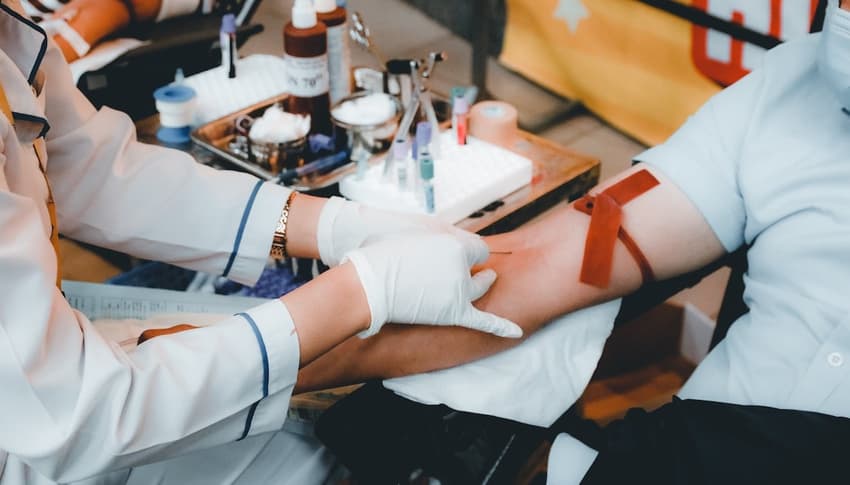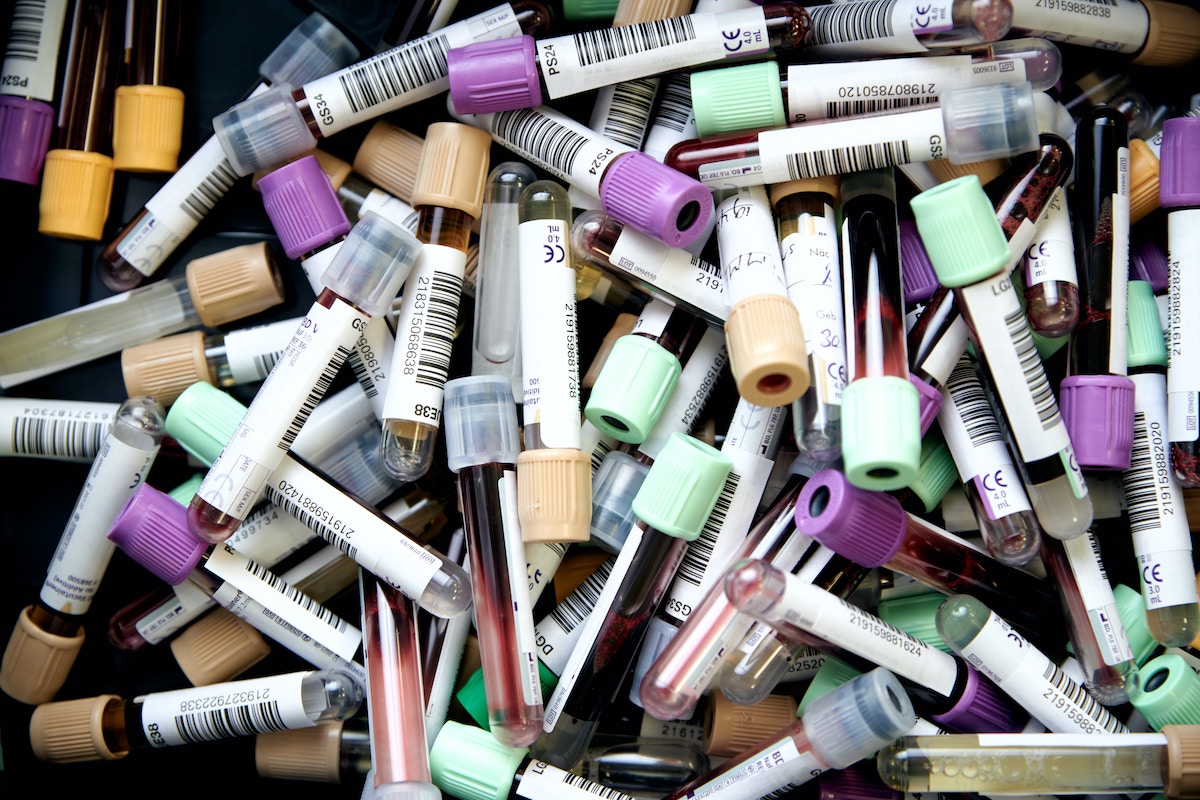EXPLAINED: How can you donate blood in Spain?

To mark world blood donor day today, June 14th, we’ve explained how and where you can donate blood in Spain.
In Spain, there were around 17 million blood donors between 2012 and 2021, according to data from the Spanish Federation of Blood Donors (FEDSANG). In terms of regions, the highest rate of blood donations was in Extremadura and Castilla y León with more than 45 per 1,000 inhabitants.
Many lives in Span are saved thanks to these donations. But, the number of blood donations is still down compared with 2011 and more is needed, so what do you need to know if you’re interested in donating your blood in Spain?
Requisites in order to be able donate blood in Spain
- Be over 18 years old.
- Weigh more than 50kg.
- Not suffer or have suffered from diseases transmitted by blood including malaria, AIDS, hepatitis B or C or tumors.
- Not be fasting.
- If you're a woman, you must not have donated more than three times per year
- Not have donated blood in the last 8 weeks.
- Pass a small medical examination that includes: blood pressure measurement, and hemoglobin levels, and complete a health questionnaire.
- Have your ID, passport or residence card.
READ ALSO: What are the different types of medical specialists called in Spanish?
Who is not allowed to donate blood in Spain?
- Those who lived in the UK between 1980 and 1996, during a minimum period of one year, due to the outbreak of mad cow disease during that time.
- People on antibiotics - you will have to wait a week to donate blood.
- People on other medications such as Proscar, Propacia or Proacutan – must wait 1 month after their final dose.
- For those who have suffered from an infection - you must wait 1 week after your symptoms have gone.
- People suffering from Anemia – must wait 4 months after recovery.
- For those who have had recent minor surgeries (dental or dermatological) – you must wait 1 week.
- For people who have had endoscopies or major surgeries – you must wait 4 months.
- Contrary to popular opinion, you can donate if you have tattoos or piercings – you must wait 4 months.
- Pregnant women – You must wait 6 months after delivery.
- If you travel abroad, as a general rule, you must wait 28 days. This may be extended in countries with endemic diseases.

Your blood will be tested for certain diseases and your blood type determined. Photo: Testalize.me / Unsplash
Blood donations and Covid-19
You cannot donate blood in Spain if:
- You have been in contact with someone was has had Covid-19 in the last 15 days or you have symptoms yourself.
- If you have been diagnosed with Covid-19, you cannot donate until 28 days after your symptoms have disappeared or 14 days after a negative PCR test.
- If you've been vaccinated, it is recommended that you wait 48 hours, unless you have had a reaction such as fever. In this case, wait 14 days.
How to donate blood in Spain?
To become a donor, you will need to go to the special blood donation points in your municipality or region. You can find them on the internet via the website of your regional health department. There are also donation points at public and private hospitals and at special mobiles that travel around cities. The Red Cross also has mobile units that are located at different points.
The process of donating is quite straightforward.
Before the donation:
- You should not be fasting.
- You must not have consumed alcohol that day.
- You have to go through a medical examination (this is carried out at the donation point you go to).
- You have to complete a health questionnaire.
READ ALSO: How does Spain's healthcare system compare with the US?
What is the blood donation process like?
The process typically takes an average of 20 minutes. The blood bag fills in approximately 10 minutes and you will need to rest afterward.
Donating blood from a 450 cc bag is done with a puncture similar to the one used during a blood test. Tubes are extracted for blood analysis: blood group, AIDS, syphilis, Hepatitis B and C, and blood cell count.
What to do after donating blood?
After the process is complete, health professionals recommend that you:
- Put pressure on the puncture site for a few minutes to avoid bruising.
- Rest and drink lots of fluids.
- Do not consume alcohol or smoke.
- Avoid exposure to high temperatures.
- Do not perform intense physical exercise.
- Avoid using heavy machinery or vehicles.
Blood donor card
If it is the first time you are donating blood, you will be sent the blood donor card, which can also be downloaded digitally in PDF in most regions.
The card is not a requirement to donate, you only have to identify yourself with your ID card such as a TIE or passport, but it also serves to identify you and provide additional information including blood type, Rh factor (ie. positive or negative) and the number of blood donations made.
Comments
See Also
In Spain, there were around 17 million blood donors between 2012 and 2021, according to data from the Spanish Federation of Blood Donors (FEDSANG). In terms of regions, the highest rate of blood donations was in Extremadura and Castilla y León with more than 45 per 1,000 inhabitants.
Many lives in Span are saved thanks to these donations. But, the number of blood donations is still down compared with 2011 and more is needed, so what do you need to know if you’re interested in donating your blood in Spain?
Requisites in order to be able donate blood in Spain
- Be over 18 years old.
- Weigh more than 50kg.
- Not suffer or have suffered from diseases transmitted by blood including malaria, AIDS, hepatitis B or C or tumors.
- Not be fasting.
- If you're a woman, you must not have donated more than three times per year
- Not have donated blood in the last 8 weeks.
- Pass a small medical examination that includes: blood pressure measurement, and hemoglobin levels, and complete a health questionnaire.
- Have your ID, passport or residence card.
READ ALSO: What are the different types of medical specialists called in Spanish?
Who is not allowed to donate blood in Spain?
- Those who lived in the UK between 1980 and 1996, during a minimum period of one year, due to the outbreak of mad cow disease during that time.
- People on antibiotics - you will have to wait a week to donate blood.
- People on other medications such as Proscar, Propacia or Proacutan – must wait 1 month after their final dose.
- For those who have suffered from an infection - you must wait 1 week after your symptoms have gone.
- People suffering from Anemia – must wait 4 months after recovery.
- For those who have had recent minor surgeries (dental or dermatological) – you must wait 1 week.
- For people who have had endoscopies or major surgeries – you must wait 4 months.
- Contrary to popular opinion, you can donate if you have tattoos or piercings – you must wait 4 months.
- Pregnant women – You must wait 6 months after delivery.
- If you travel abroad, as a general rule, you must wait 28 days. This may be extended in countries with endemic diseases.

Blood donations and Covid-19
You cannot donate blood in Spain if:
- You have been in contact with someone was has had Covid-19 in the last 15 days or you have symptoms yourself.
- If you have been diagnosed with Covid-19, you cannot donate until 28 days after your symptoms have disappeared or 14 days after a negative PCR test.
- If you've been vaccinated, it is recommended that you wait 48 hours, unless you have had a reaction such as fever. In this case, wait 14 days.
How to donate blood in Spain?
To become a donor, you will need to go to the special blood donation points in your municipality or region. You can find them on the internet via the website of your regional health department. There are also donation points at public and private hospitals and at special mobiles that travel around cities. The Red Cross also has mobile units that are located at different points.
The process of donating is quite straightforward.
Before the donation:
- You should not be fasting.
- You must not have consumed alcohol that day.
- You have to go through a medical examination (this is carried out at the donation point you go to).
- You have to complete a health questionnaire.
READ ALSO: How does Spain's healthcare system compare with the US?
What is the blood donation process like?
The process typically takes an average of 20 minutes. The blood bag fills in approximately 10 minutes and you will need to rest afterward.
Donating blood from a 450 cc bag is done with a puncture similar to the one used during a blood test. Tubes are extracted for blood analysis: blood group, AIDS, syphilis, Hepatitis B and C, and blood cell count.
What to do after donating blood?
After the process is complete, health professionals recommend that you:
- Put pressure on the puncture site for a few minutes to avoid bruising.
- Rest and drink lots of fluids.
- Do not consume alcohol or smoke.
- Avoid exposure to high temperatures.
- Do not perform intense physical exercise.
- Avoid using heavy machinery or vehicles.
Blood donor card
If it is the first time you are donating blood, you will be sent the blood donor card, which can also be downloaded digitally in PDF in most regions.
The card is not a requirement to donate, you only have to identify yourself with your ID card such as a TIE or passport, but it also serves to identify you and provide additional information including blood type, Rh factor (ie. positive or negative) and the number of blood donations made.
Join the conversation in our comments section below. Share your own views and experience and if you have a question or suggestion for our journalists then email us at [email protected].
Please keep comments civil, constructive and on topic – and make sure to read our terms of use before getting involved.
Please log in here to leave a comment.